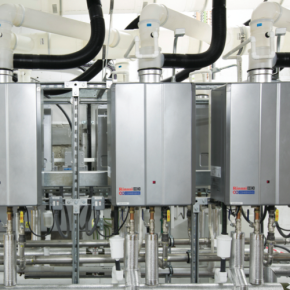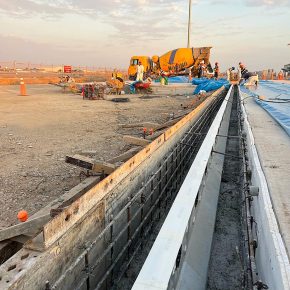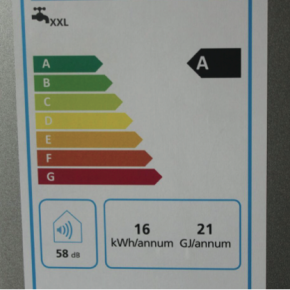
AECOM life cycle costing report highlights effectiveness of continuous flow
The latest issue of ABC+D Magazine discusses how AECOM, a major global player in the building engineering services consultancy arena, has completed a report showing that continuous flow water heating systems have a clear advantage in terms of initial capital costs as well as life cycle costs over 20 years, when compared with stored hot water systems.
The study shows that continuous flow water heating systems can be up to 7% more economical than equivalent traditional stored hot water systems.
AECOM was commissioned to carry out a life cycle study on continuous flow water heating systems and to provide a comparison with conventional storage systems. Two case studies were provided based on projects using continuous flow water heating systems. AECOM then determined an equivalent storage-based system for each case study and compared operational and capital costs.
For the life cycle comparison, the analysis period was 20 years, based on the expected service life. The net present value (NPV) calculation is based on a discount rate of 3.5% (The GREEN BOOK – HM Treasury), an inflation rate of 2% for servicing costs and projected retail fuel costs from DECC1.
In both case studies the continuous flow system showed a clear advantage in terms of initial capital costs, as well as life cycle costs over 20 years, with the continuous flow system consistently lower in energy use than the two storage systems.
Case study 1
This was a system for a typical, small, pre-fabricated fast food restaurant. It is assumed the system only serves the hot water demand.
The life cycle analysis includes the initial capital costs, projected annual fuel costs and estimated annual servicing costs which are assumed to increase by 2% each year. The annual fuel cost assumes the same daily fuel consumption over the whole year.
The servicing cost is based on £130/year per boiler and £160/year for a boiler and cylinder. The resulting net present values of the three showed that the continuous flow system is 6-7% lower than the two storage systems based on the 20-year analysis period.
Case study 2
This was a system for a shower block in a holiday camp, with six showers and four basin taps. For the continuous flow option, the analysis is based on a configuration of four continuous flow water heaters that each have a nominal output of 48kW which, for this particular application, because there is a very short run of pipework between the water heaters and the fixtures, it is possible for the water heaters to generate water at 40°C. The risk of legionella is overcome by regular flushing of the system.
For the energy required to deal with the instantaneous hot water demand, the analysis assumes that the bulk of the hot water demand would be due to the showers.
Each shower would typically have a flow rate of around 9L/m which, if mixed to 40oC, would equate to an instantaneous load of around 19kW each, so even if there was only one shower running, the load on a single continuous flow water heater would equate to an efficiency of 95% based on the performance curve.
As the hot water demand increases, the modular nature of this particular configuration would allow the 95% efficiency to be maintained for the bulk of the demand.
The difference in daily fuel costs between the three systems is around 7%. The usage profile for this case study is particularly suited to continuous flow systems (i.e. high but infrequent demand over the day), which is why there is an advantage in fuel consumption over the storage systems.
SYSTEMS EMPLOYED IN THE STUDY
This consists of separate heat source and storage cylinders where, for this study, the heat source will be gas fired boilers running on 80oC flow and 60oC return with a gross efficiency of 89%. As the hot water is stored at 60oC in insulated cylinders there will be standing heat losses. The standby electricity is assumed to be 15W per boiler and 60W when operating to cover fan and controls.
Direct fired storage systems
This is where the hot water storage cylinder has an integral gas burner to directly heat the water; the key difference with indirect fired storage systems is that they are designed to operate in condensing mode and generally achieve gross efficiency up to 96%. A disadvantage of direct fired storage systems is that the standing losses are around three times higher than indirect storage cylinders.
Continuous flow systems
This is essentially a gas boiler that is designed to instantaneously heat mains water for supply directly to water fixtures without any storage. The key advantage with this type of hot water heating is, firstly, saving in space needed for hot water cylinders and the associated standing heat losses.
The challenge is that instantaneous hot water demand can vary hugely for most systems and, therefore, the continuous flow heating system needs to have a wide modulation range as well as maintaining efficiency over that range.
Latest news

23rd January 2025
British Land decarbonises London headquarters with Mitsubishi Electric heat pumps
British Land’s flagship headquarters, York House, is benefitting from new Mitsubishi Electric heat pump technology that has fully replaced the use of gas.
Posted in Air Conditioning, Articles, Building Industry News, Building Products & Structures, Building Services, Case Studies, Facility Management & Building Services, Heating Systems, Controls and Management, Heating, Ventilation and Air Conditioning - HVAC, Pipes, Pipes & Fittings, Plumbing, Posts, Restoration & Refurbishment, Retrofit & Renovation, Sustainability & Energy Efficiency
23rd January 2025
Safeguard Europe: Out Now - Drybase TS-PLUS 5-Bar Waterproofer
Supercharge Drybase TS-PLUS Tanking Slurry with Drybase TS-PLUS 5-Bar Waterproofer – a liquid polymer additive that equips the already capable tanking slurry with the power to handle 5 bars of hydrostatic water pressure.
Posted in Articles, Building Industry News, Building Products & Structures, Building Services, Damp & Waterproofing, Facility Management & Building Services, Innovations & New Products, Posts, Restoration & Refurbishment, Retrofit & Renovation, Walls
22nd January 2025
AWMS Gatic UltraSlot meets rigorous drainage demands at Peru’s new ‘Airport City’
The new Jorge Chávez Airport in Peru is one of the most pioneering airport projects ever undertaken in South America – it features Gatic UltraSlot from Alumasc Water Management Solutions (AWMS).
Posted in Articles, Building Industry News, Building Products & Structures, Building Services, Case Studies, Civil Engineering, Concrete, Cement, Admixtures, Drainage, Drainage Services, Drainage, Guttering, Soffits & Fascias, Facility Management & Building Services, Hard Landscaping & Walkways, Landscaping, Pipes & Fittings, Plumbing, Posts, Restoration & Refurbishment, Retrofit & Renovation
22nd January 2025
Registration opens for LIFTEX 2025 (11 - 12 June)
Registration has opened for LIFTEX 2025. Now in its 37th year, the show is the UK’s only dedicated exhibition for the lift, escalator and access industry and takes place only once every three years.
Posted in Accessibility, Articles, Building Associations & Institutes, Building Industry Events, Building Industry News, Building Products & Structures, Building Regulations & Accreditations, Building Services, Exhibitions and Conferences, Facility Management & Building Services, Health & Safety, Restoration & Refurbishment, Retrofit & Renovation
 Sign up:
Sign up: 